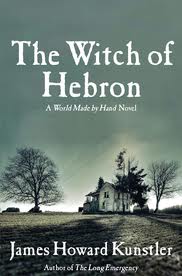Lou Aronica: Blue
March 5, 2011 by David
Filed under Fiction, WritersCast
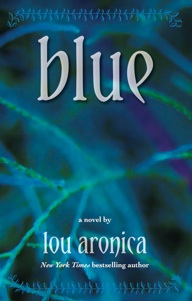 978-1936558001 – paperback – The Fiction Studio – $16.95 (e-book versions available $7.99)
978-1936558001 – paperback – The Fiction Studio – $16.95 (e-book versions available $7.99)
Lou Aronica’s Blue is an unusual novel, combining elements of science fiction, fantasy, romance and serious fiction, to create a moving story that focuses on the relationship between a daughter and her father in a terrifically moving and affecting way. Lou is an experienced and skillful writer who deftly manages to tell a story that is full of sadness and emotion and manages to avoid the deeply sentimental that might otherwise overtake the reader. Which is not to say it is not a story that will affect the reader – and some may find it difficult going, to say the least.
Reviewers and interviewers must always be careful in describing any novel’s storyline, to avoid ruining the book for prospective readers. For those who don’t want to know too much, let’s just say that Blue takes on family relationships in the face of grave illness in a beautifully imagined way. There is plenty of sadness in this novel, but Aronica succeeds in the true storyteller’s art, the transformation within a story to something greater than the experience itself.
The book is set in a contemporary suburban Connecticut much like the one the author actually lives in, so the characters and settings are all familiar and well told. At the heart of the story is the relationship between Chris Astor and his fourteen-year-old daughter, Becky, and her mother, from whom Chris is now divorced. Facing the greatest challenge of their lives, they must all learn to trust each other, and ultimately to believe in imagination and its transformational power, in order to come to terms with what is happening to them.
Blue is a remarkable and uplifting novel. I think Lou Aronica has succeeded in his goal for this book (from his website): “I wanted to write a novel that conveyed my feelings about the incomparable value of imagination and hope. Blue puts its characters through the wringer, but it is at its heart an extremely optimistic novel.”
Full disclosure: I am happy to say that Lou is someone whose friendship I value. I do want to say, also, that even if I just like a book and don’t love it, I’m unlikely to want to write about it and certainly won’t want to talk about it with the author. I feel my responsibility as an interviewer requires that I really get into a book in order to be able to ask meaningful questions about it and talk about it intelligently. I don’t love every book I read, but I truly do deeply enjoy and admire every book I write about here and talk about with their authors. For me, there is no question that Blue is a terrific book and my conversation with Lou reflects that assessment.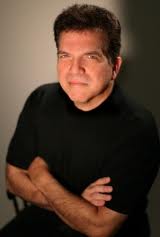 This is a book I am happy to recommend to readers, and I think it will be especially moving to anyone who is the parent of children of any age.
This is a book I am happy to recommend to readers, and I think it will be especially moving to anyone who is the parent of children of any age.
Podcast: Play in new window | Download
Publishing Talks: David Wilk interviews Mike Shatzkin
February 28, 2011 by David
Filed under Ebooks and Digital Publishing, Publishing History, PublishingTalks, Technology, The Future
 In this series of interviews, called Publishing Talks, I have been talking to book industry professionals and other smart people about the future of publishing, books, and culture. This is a period of disruption and change for all media businesses. We must wonder now, how will publishing evolve as our culture is affected by technology, climate change, population density, and the ebb and flow of civilization and economics?
In this series of interviews, called Publishing Talks, I have been talking to book industry professionals and other smart people about the future of publishing, books, and culture. This is a period of disruption and change for all media businesses. We must wonder now, how will publishing evolve as our culture is affected by technology, climate change, population density, and the ebb and flow of civilization and economics?
I hope these Publishing Talks conversations can help us understand the outlines of what is happening in the publishing industry, and how we might ourselves interact with and influence the future of publishing as it unfolds.
These interviews give people in and around the book business a chance to talk openly about ideas and concerns that are often only talked about “around the water cooler,” at industry conventions and events, and in emails between friends and they give people inside and outside the book industry a chance to hear first hand some of the most interesting and challenging thoughts, ideas and concepts being discussed by people in the book business.
Mike Shatzkin, is the founder and operator of a well known book industry consulting business called The Idea Logical Company. He’s also a blogger extraordinaire who writes incisively about issues in the book industry at The Shatzkin Files and who is never afraid to make public predictions about the future of books and the book business he knows so well, having essentially grown up in the business from an early age. He is an organizer of conferences, and a frequent speaker at publishing industry gatherings large and small.
The description of Idea Logical on its website sums up Mike’s role pretty succinctly: “The Idea Logical Company consults to book publishers and their trading partners about the changes engendered by digital transformation to every component of the value chain.” Mike has spent thirty years addressing all sorts of issues and problems for publishing and retailing clients of all sizes. In recent years, his work has focused on the changes created for the publishing industry by a variety of new and emerging digital technologies. He was an early advocate of digital publishing, and also established the concept of “verticality” or subject specific publishing as a way to organize publishing around digital technologies.
Beyond his interest and expertise in publishing, Mike is also a writer and an active entrepreneur. In this interview, we did not discuss any of his baseball related writing, editing, publishing and website development – if we had, it’s likely we would have used up all our time talking about our mutually shared passion, a subject in which Mike has also had an entire career simultaneously with his consulting work and constant thinking and analysis about books, publishers, readers and the business that serves them.
In my opinion, Mike talks just as clearly and intelligently, if not more so, than he writes, which given his writing talents, is saying alot. We certainly had a lot of fun in this conversation, which I think will be useful and interesting to anyone interested in the future of books and reading. As Mike says in his latest blog post: “Sometimes, and it would seem quite often these days, the future comes faster than you expected it.”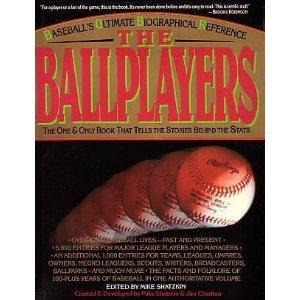
Podcast: Play in new window | Download
Brom: The Child Thief
February 23, 2011 by David
Filed under Fiction, WritersCast
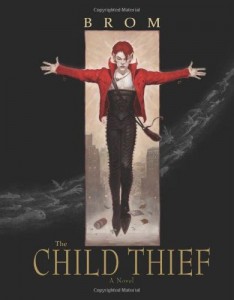 978-0061671340 – paperback – Harper Voyager – $19.99 (ebook editions available at $9.99)
978-0061671340 – paperback – Harper Voyager – $19.99 (ebook editions available at $9.99)
The Child Thief by well known illustrator and writer Brom is an absolutely stunning book. It is the Peter Pan story retold in a brilliantly imagined fashion that is completely captivating. So, yes, I did love reading this book. It is immersive, scary, and dark, but it is also wildly creative, and mashes up some of our most powerful mythological story lines to create its own narrative drive and a world inside, aside, and connected to our own that is fantastic (literally) and wonderfully psychological, and even political.
I really do not want to tell too much about the world that Brom has created, its characters or the story line as it is so much fun to discover it on one’s own. The genesis for the story was Brom’s discovery of a line in James Barrie’s original Peter Pan he found frightening but crucial, where Barrie mentions that Peter Pan would “thin out” the Lost Boys when the island population got too big. This single statement sheds a very dark light on the entire construct of the mythology of Neverland. And as he says about the character of Peter Pan himself, who kidnaps children and kills pirates (among others) – he is not really such a nice character as we imagine him now: “And more chilling is Peter’s ability to do all these things—the kidnapping, the murder—all without a trace of conscience: “I forget them after I kill them,” he (Peter) replied carelessly.”
In The Child Thief, Peter is indeed a boy who will never grow up, but his existence is oh so much more complicated than the movie and stage versions we know. Peter travels to modern day New York City to find new members for his tribe, who fight real battles in a Neverland that is now a part of Avalon and includes a great deal of real danger – even just to get there requires a frightening and challenging journey (a true rite of passage for the lost adolescents Peter has convinced to join him).
Brom’s Avalon is going through a very difficult time and there are many painful moments in this book. Death and suffering are everywhere here – this is not a book for the faint of heart or those looking for escapist fiction. By conjoining the world of Avalon to our own, and especially to the painful and bloody history of the conquering of the North American continent by European soldiers and settlers, the author has brought us face to face with the darkest elements of the modern industrial society to which we have evolved. Even at the end he avoids the easy and satisfying resolution of his story that many readers may be seeking. It’s not entirely a dark ending, but neither is it thoroughly uplifting. Personally, I loved the ambiguity throughout the book.
Brom is indeed a terrific artist – there is a section of his beautiful, evocative and sometimes chilling illustrations of all the characters in the middle of the book that is truly compelling. You can see more of his work at his website.
It was a pleasure to have a chance to speak with Brom about his work and specifically about this book. It’s so richly imagined and has so many layers, it’s easy to talk about. Brom is a wonderful story teller with a great deal to say. This is a compelling book for anyone who loves to get lost in a fully imagined alternate universe – and this one happens to be very familiar and therefore powerful, as it shatters all of our expectations so beautifully.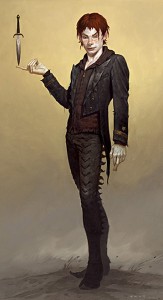
Podcast: Play in new window | Download
Publishing Talks: David Wilk interviews Don Leeper
February 14, 2011 by David
Filed under Ebooks and Digital Publishing, PublishingTalks, Technology, The Future
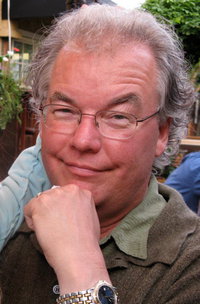 In this series of interviews, called Publishing Talks, I have been talking to book industry professionals and other smart people about the future of publishing, books, and culture. This is a period of disruption and change for all media businesses. We must wonder now, how will publishing evolve as our culture is affected by technology, climate change, population density, and the ebb and flow of civilization and economics?
In this series of interviews, called Publishing Talks, I have been talking to book industry professionals and other smart people about the future of publishing, books, and culture. This is a period of disruption and change for all media businesses. We must wonder now, how will publishing evolve as our culture is affected by technology, climate change, population density, and the ebb and flow of civilization and economics?
I believe these Publishing Talks conversations can help us understand the outlines of what is happening in the publishing industry, and how we might ourselves interact with and influence the future of publishing as it unfolds.
These interviews give people in and around the book business a chance to talk openly about ideas and concerns that are often only talked about “around the water cooler,” at industry conventions and events, and in emails between friends and they give people inside and outside the book industry a chance to hear first hand some of the most interesting and challenging thoughts, ideas and concepts being discussed by people in the book business.
Don Leeper is the founder of Bookmobile, based outside of Minneapolis, providing outsourced production services to independent and academic publishers all over the world. The company was founded as Stanton Publication Services in 1982, and has grown significantly over the years, now offering not only pre-press services for print books, as well as growing digital printing business, an expanding range of digital book production services, including ebooks and apps, and even an off-shoot business for book distribution. OR Books has hired Bookmobile to provide all of its production services, as some other publishers have also done.
What attracted my attention most recently to this company is their announcement of Ampersand, an iPad app created to preserve the layout and pagination of poetry (and of course any other book for which specific line and page layouts are critical). It’s been one of the raps on ebooks that poetry essentially does not work in the Kindle (mobi) and other popular reading devices or platforms that use ePub as the format for their content. Ampersand enables publishers (and poets who want to publish their own work) to preserve complex page compositions easily and as an app provides both a reading environment and a sales structure on the iPad (and presumably the iPhone and iPod as well).
Clearly Leeper and his crew are creative and working hard to provide a wide range of needed services for independent and academic publishers, for whom the fast changing digital environment presents significant challenges. He’s also a great example of someone who has been agile in moving from traditional publishing workflows into new digital realms while retaining a strong commitment to the important values of design and interface that will always be necessary for writers, publishers and readers, whatever the devices or delivery systems they use for reading.
Ampersand shows alot of promise for many independent publishers of poetry and other types of work where the actual page concept still matters, especially because cost of production matters most for small circulation content (there are certainly other PDF based e-book publishing methods available, but most are more costly and not highly automated). A few poetry publishers are on board with Bookmobile to pilot the Ampersand project, and we’ll be interested to see some finished work in coming months.
In this interview, Don and I had a wide ranging and lively conversation about digital publishing, poetry, and the future of print and ebooks.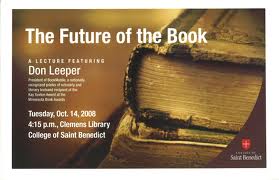
![]()
Podcast: Play in new window | Download
James Howard Kunstler: World Made by Hand
February 9, 2011 by David
Filed under Fiction, WritersCast
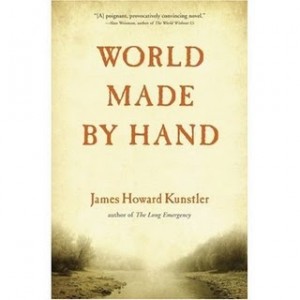 World Made by Hand – 978-0802144010 – paperback – Grove Press – $14.95 (e-book edition available)
World Made by Hand – 978-0802144010 – paperback – Grove Press – $14.95 (e-book edition available)
The Witch of Hebron: a World Made by Hand novel – 978-0802119612 – hardcover – Atlantic Monthly Press – $24.00 (e-book edition available)
This is an unusual podcast for me as it covers two books, World Made by Hand and the next in what looks to be at least a trilogy for author Kunstler, The Witch of Hebron. I had heard of, but never read any of Jim Kunstler’s books before these two, which I read much the way I read science fiction and fantasy novels when I was young, voraciously, entering and imaginatively inhabiting the world the author has created, joyfully, and always wanting more.
These two books are set in a fictional town in a real region of upstate New York, near the Hudson River, several hours north of Albany, in a period that Kunstler has dubbed The Long Emergency. That is the title of his most recent and best-selling work of nonfiction, a book I subsequently read and now believe is one of the most important books of our time.
In The Long Emergency, Kunstler describes why our current civilization is inevitably going to collapse. This is by no means a joyful prediction, but as his novels illustrate, the world ahead as we might imagine it, is not completely grim or devoid of joy and earthly human pleasure either. It is a post-fossil fuel world, and therefore much, much larger – humans do not travel thousands of miles in a day any longer. Governments have, for the most part, collapsed along with the great powerful corporations that have come to dominate our landscape. There is effectively no interstate commerce. Agriculture based on human and animal power is the dominant feature of daily life for most people.
There is a rise in human suffering, but a massive decline in human population, and during the period in which these novels are set, relatively soon after the collapse of modern civilization, there is a great deal of rediscovery of the tools and methods on which human life was built over the many centuries preceding the 21st. There are still many who remember how things were, and their beings are marked by what they knew, and lost, and now, as they are relearning how to live, by rediscovery of a different set of values. The younger generations know nothing directly of the world we now take for granted. Their lives have always been slower than ours, more physically challenging, and much more about adaptation to one’s direct physical environment. In addition to the daily necessities, it is personal relationships, family, community and local culture that this world revolves around. It is a world made by hand, and sometimes much rougher and more painful for being so, but there is a palpable sense of redemption and concern for what is good and right that underlies the world that Kunstler has imagined, that gives meaning to the struggles his characters must face throughout these two books.
Kunstler is a terrific writer and storyteller. These are fully imagined characters living in a plausible future. I can’t wait to read the next book in the series, and since it won’t be published for some time, I have been reading Kunstler’s older novels (most of which are sadly, out of print). When we talked, I had not read The Long Emergency, so our conversation is focused solely on the two novels which followed it. I’d recommend to anyone who has not read these books to start with the fiction as I did, and then go back to the nonfiction. It’s important for us to have an understanding of where we are headed, and I think it helps us to face the difficulties ahead if we can imagine ourselves into a better place, just as Jim Kunstler has done with A World Made by Hand and The Witch of Hebron.
Do visit Jim’s website, which continuously presents valuable information about where we are and what we can do about it. Make sure you take a side trip to the mini-site for these novels, which is a beautifully put together experience in and of itself. A great author biography here. We had a fantastic wide-ranging conversation about the novels, the world they are set in, and how these characters and their stories illustrate the future Kunstler has so beautifully imagined and portrayed.
Podcast: Play in new window | Download
Read All Day
 Nina Sankovitch has been an inspiration for me. From October 2008 to October 2009 she read a book a day and wrote about it (intelligently and cogently) at her website ReadAllDay. Here’s what she says about why she did it: “I began my year in an effort to come to terms with the tragic death of my oldest sister, Anne-Marie, and to find purpose and meaning in my life. I called my year of reading The 365 Project.”
Nina Sankovitch has been an inspiration for me. From October 2008 to October 2009 she read a book a day and wrote about it (intelligently and cogently) at her website ReadAllDay. Here’s what she says about why she did it: “I began my year in an effort to come to terms with the tragic death of my oldest sister, Anne-Marie, and to find purpose and meaning in my life. I called my year of reading The 365 Project.”
I’ve sent her some books to read and she has given me lots of suggestions for books I have read, and in some cases then interviewed authors for Writerscast. We’ve liked some of the same books, but judging from her site, she and I have very different reading interests. Knowing that has helped me choose some new directions, which I think is a great way to keep from falling into a reading rut.
Meanwhile, Nina’s year of reading adventure was discovered and written about by the New York Times and a number of other media outlets, and she even got a book deal. Her book is called Tolstoy and the Magic Chair: My year of magical reading will be published in June by Harper. I certainly plan to read it and interview her about it too. I’m jealous and dumbstruck with admiration for what she has done.
Anyway, the reason I am writing about Nina is because she has launched a redesigned website that I think is worth a visit. She is continuing to read and write reviews about books of all sizes and shapes – not every day of course, but more books than most people can read and write about intelligently. Here’s how she does it:
HOW TO READ All DAY
Always have a book with you.
Read while waiting.
Read while eating.
Read while exercising.
Read before bed.
Read before getting out of bed.
Read instead of updating FB.
Read instead of watching TV.
Read instead of vacuuming.
Read while vacuuming.
Read with a book group.
Read with your kid.
Read with your cat.
Read to your dog.
Read on a schedule.
Always have a book with you.
Thank you Nina!
Publishing Talks: David Wilk interviews Rick Richter
February 2, 2011 by David
Filed under Ebooks and Digital Publishing, PublishingTalks, The Future
 In this series of interviews, called Publishing Talks, I have been talking to book industry professionals and other smart people about the future of publishing, books, and culture. This is a period of disruption and change for all media businesses. We must wonder now, how will publishing evolve as our culture is affected by technology, climate change, population density, and the ebb and flow of civilization and economics?
In this series of interviews, called Publishing Talks, I have been talking to book industry professionals and other smart people about the future of publishing, books, and culture. This is a period of disruption and change for all media businesses. We must wonder now, how will publishing evolve as our culture is affected by technology, climate change, population density, and the ebb and flow of civilization and economics?
I believe these Publishing Talks conversations can help us understand the outlines of what is happening in the publishing industry, and how we might ourselves interact with and influence the future of publishing as it unfolds.
These interviews give people in and around the book business a chance to talk openly about ideas and concerns that are often only talked about “around the water cooler,” at industry conventions and events, and in emails between friends and they give people inside and outside the book industry a chance to hear first hand some of the most interesting and challenging thoughts, ideas and concepts being discussed by people in the book business.
I’ve known Rick Richter for a number of years. He is smart, energetic and incredibly creative. I am told he plays a mean guitar too. He’s unusual in publishing for having been a leader in both sales and editorial, and for being at heart, an innovator and entrepreneur. I have talked to him a number of times over the past couple of years about his thinking and ideas, and have been interested in his new venture, Ruckus Media since it was still a brainstorm generated idea. Unlike many brainstormed ideas, this one has become real, and very quickly too.
Ruckus represents at least one budding trend in publishing for kids – which is to be born digital and to stay that way. Print, ink and paper will be someone else’s job. At a recent Digital Book World presentation, Rick’s signature statement about his new work was this: “books you can play with and games you can read.”
Rick is currently President, CEO, and Chair, Ruckus Media Group. Previous to founding Ruckus, he was President and Publisher of the Simon & Schuster Children’s Division (1996 – 2008). In 1990, Rick co-founded Candlewick Press, the prestigious children’s publisher based in Boston.
“The goal of Ruckus is to combine the most creative minds in children’s media with tremendously exciting new mobile devices. We’ll be satisfied when a mom or dad can hand their phone or tablet to their child without one ounce of guilt, knowing that the experience the child is about to have will entertain them, challenge them, perhaps make them giggle, and be utterly satisfying.” Beginning in May, Rick will be an adjunct professor at the NYU Master of Science Program in Publishing.
Rick and I had a great talk, not just about what he is doing at Ruckus to make change and create a new way of publishing for kids, but also about the future of digital publishing and much more. Ruckus, along with a number of other new digital publishers are in the process of establishing new ways for children to experience books and reading in some very exciting ways. And it looks like they are having alot of fun doing it.
Podcast: Play in new window | Download
Mickey Leigh: I Slept with Joey Ramone
January 28, 2011 by David
Filed under Non-Fiction, WritersCast
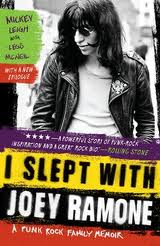 978-1439159750 – paperback – Simon & Schuster – $15.99 (ebook versions available $12.99)
978-1439159750 – paperback – Simon & Schuster – $15.99 (ebook versions available $12.99)
Mickey Leigh grew up in Queens in the 1950s and 1960s as Mitchel Hyman. His brother was Jeffrey Hyman, more famously known as Joey Ramone, lead singer of the great American punk rock band, The Ramones. I Slept with Joey Ramone (subtitle: a punk rock family memoir) tells their story from the beginning to the end of Joey’s relatively short life and just a bit farther into the almost present day. Mickey had some writing help from rock journalist Legs McNeil, and throughout the book, the story is told compellingly in Mickey’s voice and from his perspective.
We start in Queens where the boys grow up somewhat rockily. Their family situation was never easy, and Mitchel and Jeff were bullied misfits. Joey had both physical and psychological issues that manifested early in his life. Music became their savior very early, but at the beginning it was Mitchel (Mickey) who was the musician, and it took some time before the very complicated Jeff got together with the band that became the Ramones and found not only his voice, but his new identity.
The Ramones story as told by Mickey Leigh, is pretty incredible, even for fans who know something about the band and were there during the glory days. The relationships between the various band members were legendarily terrible. How this band stayed together and made such incredible music is still a mystery. Mickey was there at the beginning; John Cummings, aka Johnny Ramone, was initially his best friend. Mickey ended up being the band’s first roadie, while Joey, the quintessential misfit outsider, became the front man singer of what eventually became one of the greatest rock bands of all time. Later Mickey had his own career with a number of bands, as well as being a songwriter too.
The many stories and incidents recounted in this book are never boring, even when the sometime strange and complicated elements of Joey Ramone’s personality begin to repeat themselves over years. There is a tremendous amount of love here, and some not so nice things as well. Mickey’s own story is complicated and he has alot to say about alot of the people he worked with, for and sometimes against throughout the years. Nothing here is ever boring. It’s sometimes sad and frustrating to know how things were for Joey Ramone and his family, friends and associates, as it was often difficult, confusing and painful for all of them. Even years later, when they were inducted into the Rock and Roll Hall of Fame, the Ramones created an emotionally complicated scene.
Ultimately, Mickey (and doubtless Legs too) has captured beautifully a unique and special part of modern musical history, that is also the story of redemption, which is after all, the real story of rock and roll. And at the end Joey and Mickey always did make up. As Mickey tells it, the last time really counted the most. “He pulled me down to him, and he just didn’t let go. I can still feel that hug.” This is a book well worth reading for anyone interested in New York punk rock. I had a great time talking to him about the book and his experiences in rock and roll.

Podcast: Play in new window | Download
Yet another blog?
 Well not really. I’ve been posting author and book industry interviews at Writerscast now for just about two years, and while I like to feel that the work speaks for itself, I’ve often felt the need to share information and news with my (growing) audience. Aside from Twitter, which is lovely but oh-so-brief, there really has been no way for me to talk about matters related to the site and its content here.
Well not really. I’ve been posting author and book industry interviews at Writerscast now for just about two years, and while I like to feel that the work speaks for itself, I’ve often felt the need to share information and news with my (growing) audience. Aside from Twitter, which is lovely but oh-so-brief, there really has been no way for me to talk about matters related to the site and its content here.
By introducing this little section of Writerscast dubbed “Pipeline,” I can let you know when I come across interesting publishing related news, talk about books that may not be among those whose authors I interview, or just tell you when I am going on vacation and won’t be posting new interviews for a few days. I’ll spare you any thought pieces or pontifications about publishing here (saving that for www.booktrix.com.)
In Pipeline I can also tell you about some of the upcoming posts on Writerscast, or other sites I have discovered I think you should know about, information I hope will be helpful to everyone who visits this site.
For example, my next author interview is with Mickey Leigh about his memoir, I Slept with Joey Ramone. My next Publishing Talks interview is with the always interesting Rick Richter, who has founded a new digital publishing company called Ruckus Media. I think you will enjoy both of these talks.
Please feel free to email me, David Wilk, at david@booktrix.com. Your suggestions, comments, complaints, etc. are always welcome. Praise too, if you hear something you really like at Writerscast. I’m always looking for interesting people to interview, so let me know who is out there I should be talking to and how to reach them.
And for those of you, like me, buried in snow, just remember that spring is less than 60 days away!
Douglas Rushkoff: Program or be Programmed
January 11, 2011 by David
Filed under Non-Fiction, WritersCast
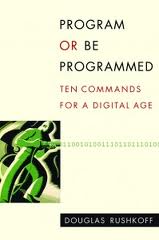 978-1935928157 – Paperback – OR Books – $16.00 (ebook edition $10.00)
978-1935928157 – Paperback – OR Books – $16.00 (ebook edition $10.00)
with terrific original illustrations by Leland Purvis.
I think this book, Program or be Programmed: Ten Commands for a Digital Age by digital critic and thinker Douglas Rushkoff, should be required reading for anyone interested in modern culture, politics or economics. It’s a short book, densely argued, that requires careful reading and attention to its ideas. Which probably makes it daunting to many in this era of fragmented ideas and short subjects. But it’s divided into ten clear sections (note “commands” as in programming inputs, rather than “commandments” as in biblical instructions) and is well worth the effort a reader must put into reading it.
I spent more time with this short book than with many much longer books I have read recently. And I am very happy I did. As Howard Rheingold says “Thinking twice about our use of digital media, what our practices are doing to us, and what we are doing to each other, is one of the most important priorities people have today.” It’s impossible not to agree. And Rushkoff understands the complexity of behavior and thinking that the always-on, always-connected internet has brought to modern culture.
It’s not about whether the internet is good or bad, or whether online culture somehow supplants a more preferable offline one. As the publisher says about this book, “the real question is, do we direct technology, or do we let ourselves be directed by it and those who have mastered it? “Choose the former,” writes Rushkoff, “and you gain access to the control panel of civilization. Choose the latter, and it could be the last real choice you get to make.”
Having the opportunity to talk about these ideas with Rushkoff was tremendously exciting and invigorating. He’s a really smart guy whose clarity of thought I admire alot. I’ve spent alot of time participating in, reading about and analyzing new media and modern culture myself, and I know I have learned alot from Douglas Rushkoff’s books and ideas. I think Program or be Programmed is one of the most important books I have read in a long time.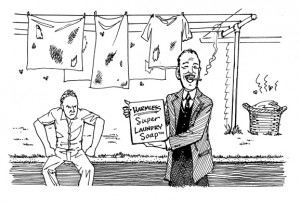
Podcast: Play in new window | Download


